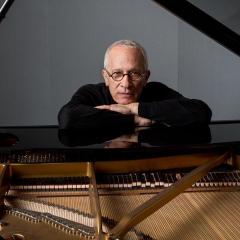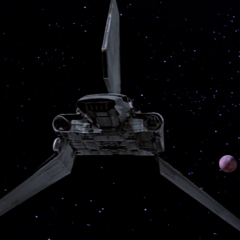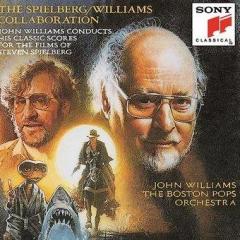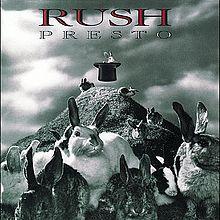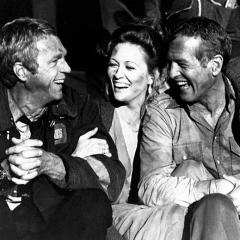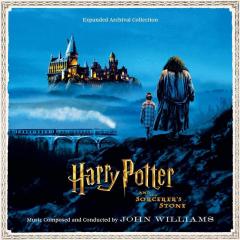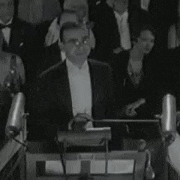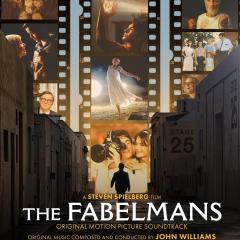
Lewya
-
Posts
937 -
Joined
-
Last visited
-
Days Won
2
Reputation Activity
-

-

-
 Lewya got a reaction from Quintus in Hans Zimmer's top 40 film scores of all time - he included 2 John Williams scores
Lewya got a reaction from Quintus in Hans Zimmer's top 40 film scores of all time - he included 2 John Williams scores
I haven't seen this list posted before on the forum - it was shared in april last year.
Elliot Goldenthal and Jerry Goldsmith are the two film composers with the scores in Zimmer's list, the only ones with three scores each in Zimmer's top 40. A bit surprised Zimmer didn't pick more scores by Morricone, as he is Zimmer's #1 film composer of all time.
Hans Zimmer's top 40 film scores of all time (in no order):
Titus Victorius from Titus composed by Elliot Goldenthal
Adagio from Alien 3 composed by Elliot Goldenthal
Alcoba Azul from Frida composed by Elliot Goldenthal
Main Title from Alien composed by Jerry Goldsmith
The Reactor / The Hologram from Total Recall composed by Jerry Goldsmith
Main Theme from Basic Instinct composed by Jerry Goldsmith
Wild Signals from Close Encounters of the Third Kind composed by John Williams
Washington Ending / Raiders March from Raiders of the Lost Ark composed by John Williams
The Mission from The Mission composed by Ennio Morricone
Main Theme from Once Upon a Time in the West composed by Ennio Morricone
Love Theme from The Godfather composed by Nino Rota
La Bella Malinconica from La Dolce Vita composed by Nino Rota
Titles from Chariots of Fire composed by Vangelis
End Titles from Blade Runner composed by Vangelis
Theme from Back to the Future composed by Alan Silvestri
Main Title from Predator composed by Alan Silvestri
Theme / Isandhlwana from Zulu composed by John Barry
Wednesday's Child from The Quiller Memorandum composed by John Barry
Avalon / Moving Day from Avalon composed by Randy Newman
The Natural from The Natural composed by Randy Newman
Malcolm Is Dead from The Sixth Sense composed by James Newton Howard
Can I Trust You? from Red Sparrow composed by James Newton Howard
Test Drive from How to Train Your Dragon composed by John Powell
Dedication from United 93 composed by John Powell
Main Title from King Kong composed by Max Steiner
Main Title from Gone with the Wind composed by Max Steiner
Coronation from Kingdom of Heaven composed by Harry Gregson-Williams
Main Title Theme from The English Patient composed by Gabriel Yared
The Umbrellas of Cherbourg from The Umbrellas of Cherbourg composed by Michel Legrand
Theme from Midnight Express composed by Giorgio Moroder
Dawn / Buck Up - Never Say Die / Smile from Modern Times composed by Charlie Chaplin
Prologue and Main Title / Castle Plunkett from High Spirits composed by George Fenton
Main Title Theme from The Last Emperor composed by David Byrne
Ballad for Mathilda from Léon composed by Éric Serra
Merry Christmas Mr. Lawrence from Merry Christmas Mr. Lawrence composed by Ryuichi Sakamoto
Future Markets from There Will Be Blood composed by Jonny Greenwood
Main Title from Laura composed by David Raksin
Main Title from Taxi Driver composed by Bernard Herrmann
Tsurumaru's Flute / Azusa Castle In Ruins from Ran composed by Toru Takemitsu
The Shawshank Redemption from The Shawshank Redemption composed by Thomas Newman
-

-

-

-

-

-

-

-

-

-

-

-
 Lewya got a reaction from Tydirium in 2020 Oscars - Best Original Score predictions
Lewya got a reaction from Tydirium in 2020 Oscars - Best Original Score predictions
Only ONE critic out of 122 critics wanted Williams to win for The Rise of Skywalker while 40 critics wanted Joker to win. Surprised Desplat was only 5 votes away from Joker to be honest:
Best Original Score
1. Hildur Guðnadóttir, “Joker” (40 votes)
2. Alexandre Desplat, “Little Women” (35 votes)
3. TIE: Randy Newman, “Marriage Story” (23 votes) / Thomas Newman, “1917” (23 votes)
4. John Williams, “Star Wars: The Rise of Skywalker” (1 vote)
https://www.indiewire.com/2020/02/which-movies-should-win-oscars-2020-critics-vote-parasite-1202209448/
-
 Lewya got a reaction from Fabulin in 2020 Oscars - Best Original Score predictions
Lewya got a reaction from Fabulin in 2020 Oscars - Best Original Score predictions
Only ONE critic out of 122 critics wanted Williams to win for The Rise of Skywalker while 40 critics wanted Joker to win. Surprised Desplat was only 5 votes away from Joker to be honest:
Best Original Score
1. Hildur Guðnadóttir, “Joker” (40 votes)
2. Alexandre Desplat, “Little Women” (35 votes)
3. TIE: Randy Newman, “Marriage Story” (23 votes) / Thomas Newman, “1917” (23 votes)
4. John Williams, “Star Wars: The Rise of Skywalker” (1 vote)
https://www.indiewire.com/2020/02/which-movies-should-win-oscars-2020-critics-vote-parasite-1202209448/
-
 Lewya got a reaction from Will in R.I.P. Kobe Bryant, for whom JW wrote Dear Basketball
Lewya got a reaction from Will in R.I.P. Kobe Bryant, for whom JW wrote Dear Basketball
A statement from JW himself on Kobe's passing in NY Times:
Williams said in a statement Sunday that Bryant’s death was “a terrible and immeasurable loss.”
“During my friendship with Kobe, he was always seeking to define and understand inspiration even while modestly, and almost unknowably, he was an inspiration to countless millions,” Williams said. “His enormous potential contribution to unity, understanding and social justice must now be mourned with him.”
https://www.nytimes.com/2020/01/26/sports/basketball/kobe-bryant-oscar-award.html
Edit: Oh, I see it was already posted in another thread, oh well...
-
 Lewya got a reaction from Tydirium in Hans Zimmer's top 40 film scores of all time - he included 2 John Williams scores
Lewya got a reaction from Tydirium in Hans Zimmer's top 40 film scores of all time - he included 2 John Williams scores
He took over a big Spotify playlist with many followers where sometimes a director or composer picks their favourite film music, it has since been removed, but the user I posted above saved the tracks before it got removed.
https://newsroom.spotify.com/2019-04-03/composer-hans-zimmer-talks-musics-starring-role-in-movies/
-
 Lewya got a reaction from Will in Hans Zimmer's top 40 film scores of all time - he included 2 John Williams scores
Lewya got a reaction from Will in Hans Zimmer's top 40 film scores of all time - he included 2 John Williams scores
I haven't seen this list posted before on the forum - it was shared in april last year.
Elliot Goldenthal and Jerry Goldsmith are the two film composers with the scores in Zimmer's list, the only ones with three scores each in Zimmer's top 40. A bit surprised Zimmer didn't pick more scores by Morricone, as he is Zimmer's #1 film composer of all time.
Hans Zimmer's top 40 film scores of all time (in no order):
Titus Victorius from Titus composed by Elliot Goldenthal
Adagio from Alien 3 composed by Elliot Goldenthal
Alcoba Azul from Frida composed by Elliot Goldenthal
Main Title from Alien composed by Jerry Goldsmith
The Reactor / The Hologram from Total Recall composed by Jerry Goldsmith
Main Theme from Basic Instinct composed by Jerry Goldsmith
Wild Signals from Close Encounters of the Third Kind composed by John Williams
Washington Ending / Raiders March from Raiders of the Lost Ark composed by John Williams
The Mission from The Mission composed by Ennio Morricone
Main Theme from Once Upon a Time in the West composed by Ennio Morricone
Love Theme from The Godfather composed by Nino Rota
La Bella Malinconica from La Dolce Vita composed by Nino Rota
Titles from Chariots of Fire composed by Vangelis
End Titles from Blade Runner composed by Vangelis
Theme from Back to the Future composed by Alan Silvestri
Main Title from Predator composed by Alan Silvestri
Theme / Isandhlwana from Zulu composed by John Barry
Wednesday's Child from The Quiller Memorandum composed by John Barry
Avalon / Moving Day from Avalon composed by Randy Newman
The Natural from The Natural composed by Randy Newman
Malcolm Is Dead from The Sixth Sense composed by James Newton Howard
Can I Trust You? from Red Sparrow composed by James Newton Howard
Test Drive from How to Train Your Dragon composed by John Powell
Dedication from United 93 composed by John Powell
Main Title from King Kong composed by Max Steiner
Main Title from Gone with the Wind composed by Max Steiner
Coronation from Kingdom of Heaven composed by Harry Gregson-Williams
Main Title Theme from The English Patient composed by Gabriel Yared
The Umbrellas of Cherbourg from The Umbrellas of Cherbourg composed by Michel Legrand
Theme from Midnight Express composed by Giorgio Moroder
Dawn / Buck Up - Never Say Die / Smile from Modern Times composed by Charlie Chaplin
Prologue and Main Title / Castle Plunkett from High Spirits composed by George Fenton
Main Title Theme from The Last Emperor composed by David Byrne
Ballad for Mathilda from Léon composed by Éric Serra
Merry Christmas Mr. Lawrence from Merry Christmas Mr. Lawrence composed by Ryuichi Sakamoto
Future Markets from There Will Be Blood composed by Jonny Greenwood
Main Title from Laura composed by David Raksin
Main Title from Taxi Driver composed by Bernard Herrmann
Tsurumaru's Flute / Azusa Castle In Ruins from Ran composed by Toru Takemitsu
The Shawshank Redemption from The Shawshank Redemption composed by Thomas Newman
-
 Lewya got a reaction from Sharkissimo in The Leonard Rosenman Thread
Lewya got a reaction from Sharkissimo in The Leonard Rosenman Thread
It is extremely rare that a film composer receives this kind of attention from leading concert composers, so Rosenman must have done things right.
Both John Adams and John Corigliano are fans of him, especially of East of Eden and Rebel Without a Cause with Adams favoring the latter and Corigliano the former. Rosenman himself considered East of Eden his best score.
Here is what John Adams wrote about Rosenman in liner notes in the East of Eden and Rebel Without a Cause recording he conducted:
Leonard Rosenman is an important transitional figure in the history of film music: a highly skilled composer whose best work evolved during a critical period between that of old school Europeans like Max Steiner and Dimitri Tiomkin and that of the later, more pop-oriented composers of the 60s, 70s and beyond. Rosenman was doubtless one of the most thoroughly schooled musicans ever to work in Hollywood. Before making an acquaintance of director Elia Kazan in New York in 1954, he studied composition and theory at the University of California, Berkeley with Roger Sessions, the most serious of all serious composers. He was thoroughly familiar with all the latest modern techniques in the works of Stravinsky, Bartók and Schoenberg. Most importantly, he possessed one thing Sessions lacked: the common touch, an ability to mirror the American vernacular experience in his music. This was an essential ability for anyone hoping to make a successful foray into commcercial film music.
East of Eden, Rosenman's first score was an ideal vehicle for his talents. The John Steinbeck story combines homespun simplicities of mid-century American social realism with the darker, more symbolic themes of filial disobedience and Oedipal search for his the lost mother. Set among the lush and irresistible beauty of the northern California coast, this 1955 film took the young James Dean into almost instant celebrity in the role of the tormented, misunderstood and unappreciated brother and son. The story, with its consciously Old Testament motifs acted by an ensemble of exceptionally gifted performers, including Julie Harris, Raymond Massey and Burl Ives, is one of the better examples of what a major Hollywood film could achieve.
Rosenman's score is, when required, appropriately evocative of a "simple" American past (the story takes place during World War I). He utilizes both the widely spaced harmonies and simple diatonic tunes made famous by Copland, but Rosenman's ideas are never whole-cloth borrowings. His music has its own originality. The famous "Main Theme" with its innocent, almost childlike 3/4 lilt is one of the most memorable melodies in all American cinema. The music matches the qualities of Steinbeck's prose with uncanny exactness, at one moment being simple and plainspoken to the point of rusticity, and then modulating abruptly to a suppressed brooding that is far more sophisticated and self-aware than any earlier example of music for the screen.
Written a year later, Rebel Without a Cause was musically even more successful, although the film, with its portrayal of misguided, troubled American youth, lacked the depth and richness of the Steinbeck story. While East of Eden was a period piece evoking for the American viewer an already lost idyllic past, Rebel Without a Cause was harshly contemporary and showed a strong influence of film noir in its treatment of the subject and characters. It may well be the film that created the whole "Fifties" stereotype, with its pompadour male hairstyles, car fetishes, and gangs of disaffected teenagers given to casual violence and unable to communicate with their uncomprehending elders. It is perhaps not insignificant that his film predates the premiere of West Side Story by two years.
For the film, which provided another starring role for James Dean and an early appearance by all-too-worldly Natalie Wood, Rosenman created a complex score that moves effortlessly between the urban big band jazz of Stan Kenton and the moody atmospheres of Bartók and Stravinsky. Bartók's Music for Strings, Percussion and Celesta, hardly known to the general public in 1955, makes a particularly evocative model in film's "planetarium" scene, during which the 50s' newfound preoccupation with outer space and extraterrestial events is eerily worked into the film's existential themes. The fractured rhythms and polytonalities of Stravinsky's Rite of Spring are felt in the scenes of violence and terror, although here, as elsewhere, Rosenman never loses his own original voice. Unlike many a lesser film composer, Rosenman managed to avoid resorting to hasty pastiche or overt borrowing. The two scores show what could actually be achieved when a skilled composer and a director sensitive to the powers of music were allowed to work together under conditions of artistic freedom, unimpeded by the crush of market forces - a rare moment in an industry in which art and money always maintain a difficult equipoise. - JOHN ADAMS
During Sunday's pre-concert talk, conductor John Adams – who recorded Rosenman's East of Eden and Rebel Without a Cause suites for Nonesuch in 1995 – described the composer as "one of the most important, skilled and knowledgeable of all film composers." "Adams took the microphone during the concert to extol Rosenman's virtues, calling him a "sophisticated composer" who helped to bring "psychological depth" to 1950s films like Rebel Without a Cause."
John Corigliano: "East of Eden with Leonard Rosenman's music, is a great film on every level. It's like a combination of Berg and Barber and it's beautiful, and it has a simple American melody also of pure innocence. That score is great. It's so powerful, and in addition to that highly chromatic and nervous, wonderful sinewy beauty he also has an innocence like Copland. It should have a symphonic version played by major orchestras".
-
 Lewya got a reaction from Yavar Moradi in Thomas Newman, Elliot Goldenthal, Leonard Rosenman and Hans Zimmer pick the 5 best film scores of all time
Lewya got a reaction from Yavar Moradi in Thomas Newman, Elliot Goldenthal, Leonard Rosenman and Hans Zimmer pick the 5 best film scores of all time
I just found their picks.
Thomas Newman's top 5 film scores of all time:
1. Chinatown - Jerry Goldsmith - ”For its mood — it fits the time and place perfectly.”
2. To Kill a Mockingbird - Elmer Bernstein - ”Very effective, it just works.”
3. Psycho - Bernard Herrmann - ”Unique and utterly unusual.”
4. The Wizard of Oz - Herbert Stothart - ”Sure, I love the songs, but the score itself is excellent.”
5. King Kong - Max Steiner - ”There's a total sense of popcorn fun. It's a fountainhead score - the beginning of something new.”
Elliot Goldenthal's top 5 film scores of all time:
1. Cape Fear - Bernard Herrmann - ”He was the first minimalist. The score was played at a volume where it wouldn't compete with the movie's sound effects.”
2. La Strada - Nino Rota - ”It brought together the carnival and sensual elements of the church.”
3. Altered States - John Corigliano - ”With this soundtrack, he reinvented orchestration in film scoring.”
4. On the Waterfront - Leonard Bernstein - ”His only score had the sky-soaring melodic beauty of the American school.”
5. The Informer - Max Steiner - ”This has both Irish and Celtic folk melodies combined with a sweeping orchestral tapestry. It's brilliant.”
Leonard Rosenman's top 5 film scores of all time (in no order, although we can assume the Herrmann score is his #1):
Psycho - Bernard Herrmann
Jaws - John Williams
Gone with the Wind - Max Steiner
Patton - Jerry Goldsmith
East of Eden - Leonard Rosenman
He included himself among the 5 best film scores of all time.
Hans Zimmer's top 5 film scores of all time (in no order, although he has said at another time that the Morricone score is his #1):
Once Upon a Time in America - Ennio Morricone
Blade Runner - Vangelis
Midnight Express - Giorgio Moroder
Close Encounters of the Third Kind - John Williams
The Shawshank Redemption - Thomas Newman
Thoughts on their picks?
-
 Lewya got a reaction from The Illustrious Jerry in Justin Hurwitz's FIRST MAN (2018)
Lewya got a reaction from The Illustrious Jerry in Justin Hurwitz's FIRST MAN (2018)
Two tracks from the score have been released exclusively:
https://ew.com/movies/2018/10/04/first-man-score-first-listen-exclusive/
-
 Lewya reacted to publicist in What Is The Last Score You Listened To? (older scores)
Lewya reacted to publicist in What Is The Last Score You Listened To? (older scores)
At 75 minutes, there's a lot of formless (read: picture-dependant) clutter, but with its quintessential Newmanisms (the plucky bluegrass-vs-solemn americana variety), it is on par with things like 'Green Mile'. Cues like the Main Title, Across Texas, The Other Fifty and the End Credits make for an agreeable listen - though like with Horner or post-2005 Williams you might rightly bemoan the fact that it's another unnecessary preservation effort. Like with these two gentlemen, you can still acknowledge there's some good craftmanship at work, though Newman's many spherical tableaus are certainly a less demanding chore.
-
 Lewya got a reaction from Chewy in Which two scores would you recommend to a complete novice and why?
Lewya got a reaction from Chewy in Which two scores would you recommend to a complete novice and why?
I would never go for the poor Titanic or a relatively mediocre pastiche score like HP 3. Neither of them are "essential" nor do they represent film music at its best. You could argue that Titanic is even a score that gave film music a bad reputation.
A Streetcar Named Desire and East of Eden would be two good candidates to begin with though I think. Why? Because they used modern music and both of the scores contain music that represents film music at its best. At their best, they have never been surpassed in the field. Both by two of the most formidable composers to ever work in the field as well.
-
 Lewya got a reaction from Holko in Which two scores would you recommend to a complete novice and why?
Lewya got a reaction from Holko in Which two scores would you recommend to a complete novice and why?
I would never go for the poor Titanic or a relatively mediocre pastiche score like HP 3. Neither of them are "essential" nor do they represent film music at its best. You could argue that Titanic is even a score that gave film music a bad reputation.
A Streetcar Named Desire and East of Eden would be two good candidates to begin with though I think. Why? Because they used modern music and both of the scores contain music that represents film music at its best. At their best, they have never been surpassed in the field. Both by two of the most formidable composers to ever work in the field as well.


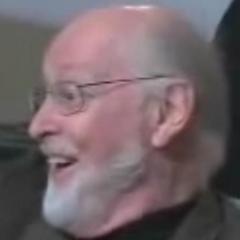
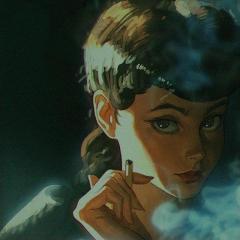
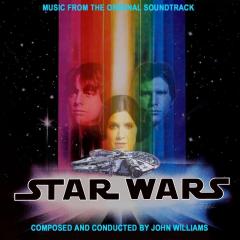
.thumb.gif.df2a851b259fbffe34b18fc1c796422a.gif)
